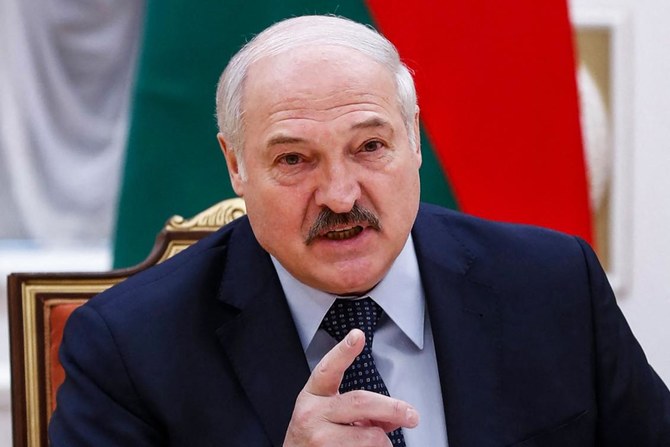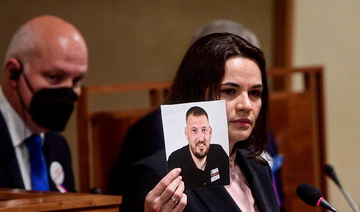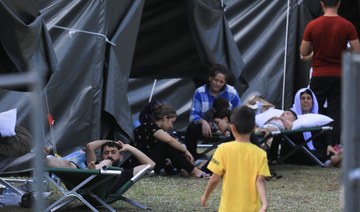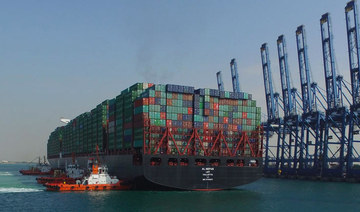WASHINGTON: The United States imposed fresh sanctions on Monday on the regime of Belarusian President Alexander Lukashenko, accusing him of carrying out a “brutal” crackdown on opponents.
“One year ago today, the people of Belarus sought to make their voices heard and shape their own future through that most basic expression of democracy — an election,” US President Joe Biden said in a statement.
“Rather than respect the clear will of the Belarusian people, the Lukashenko regime perpetrated election fraud, followed by a brutal campaign of repression to stifle dissent,” Biden said.
“The actions of the Lukashenko regime are an illegitimate effort to hold on to power at any price,” he said.
The US president signed an executive order expanding sanctions which have been in place on the Russian neighbor since 2006, targeting a slew of Belarusian officials, business executives and companies.
The latest sanctions take aim at various sectors of the Belarusian economy, including banking, defense, energy, construction and transportation.
Also targeted was the Belarusian National Olympic Committee, accused of facilitating money laundering, sanctions evasion and failing “to protect Belarusian athletes from political discrimination and repression.”
Belarusian sprinter Krystsina Tsimanouskaya sought protection at the Tokyo Olympics to avoid being forced onto a plane home, saying she feared for her life after criticizing her coaches.
Tsimanouskaya was granted a humanitarian visa by Poland and she told AFP in an interview in Warsaw on Monday that she “would like my country to be free.”
Tsimanouskaya was among the Belarusian sports figures who publicly criticized violence against protesters at demonstrations that gripped the ex-Soviet country after the August 9, 2020 presidential vote.
Also targeted by US sanctions was state-owned Belaruskali OAO, which the executive order said is one of the world’s largest producers of potash and a “source of illicit wealth for the regime.”
Prominent business executives who support the Lukashenko regime were also sanctioned along with 15 of their companies including the private bank Absolut Bank.
In power since 1994, Lukashenko has been cracking down on opponents since unprecedented protests erupted after last year’s election.
Among the actions for which the Lukashenko regime was being sanctioned, Biden said, was the diversion in May of a Ryanair plane and the subsequent arrest of an opposition activist and his girlfriend who were on board.
In London, the UK government said that it will prevent Belarusian air carriers from flying over or landing in Britain and broadened a litany of financial sanctions because of “the continued undermining of democracy and human rights violations.”
In his statement, Biden recalled that he had met recently in Washington with Belarusian opposition leader Svetlana Tikhanovskaya and told her “we stand with the people of Belarus as they bravely pursue their democratic aspirations.”
Western nations have already imposed a raft of sanctions on Lukashenko and his regime, but they appear to have had limited effect as he maintains backing from key ally and creditor Russia.
The latest US sanctions come rising tensions between the United States and Russia’s Vladimir Putin, the chief ally of the Belarusian president.
The 66-year-old Lukashenko on Monday denounced the United States and Britain for imposing new sanctions on his regime and insisted he won a “totally transparent” vote.”
“You will choke on these sanctions in the United Kingdom,” Lukashenko said at his annual press conference, a marathon event that lasts for hours.
“You are risking starting World War III,” he added. “Is that what you are trying to push us and the Russians to?“
He denied widespread reports of torture in Belarusian prisons. Local rights groups say Belarus has over 600 political prisoners and have recorded testimonies of torture.
Lukashenko also said his country’s KGB had nothing to do with the death of 26-year-old Belarusian activist Vitaly Shishov, who was found hanged in a Kiev park last week.
US slaps new sanctions on Belarus regime
https://arab.news/6hv87
US slaps new sanctions on Belarus regime

- "The actions of the Lukashenko regime are an illegitimate effort to hold on to power at any price," said the US President
- The latest sanctions take aim at various sectors of the Belarusian economy, including banking, defense, energy, construction and transportation
Third-party US presidential candidate Jill Stein calls for suspension of military aid to Israel

- Stein, a member of the Green Party, says she would stop ‘police oppression’ of students protesting against the war in Gaza, and preserve the rights of Arab and Muslim Americans
- She approached Lebanese American Abdullah Hammoud, mayor of Dearborn, Michigan, to be her running mate but he is 3 months too young to meet Constitutional age requirements
CHICAGO: Jill Stein, who is campaigning to stand as a third-party candidate in the US presidential election in November, said that if elected she would immediately halt military support for Israel’s “apartheid government,” and push Israelis and Palestinians to embrace a “genuine peace.”
In an exclusive interview with Arab News, she said American policy on the Israel-Palestine conflict is driven by lobbyists, and that anyone who challenges the Israeli government over its responsibility for ethnic cleansing in Palestine is denied their constitutional rights.
Stein is a candidate for the Green Party, which advocates on a range of issues, including environmental action and the constitutional rights “of all Americans.” She said she would halt the “police oppression” of students who stage campus protests demanding an end to what many consider a genocide in Gaza, stop the flow of weapons to Israel’s government, and preserve the rights of Arab and Muslim Americans who “continue to be the victims of racism, violence and Islamophobia.”
She added: “Arab and Muslims have been taken for granted in America. They are victims of racial profiling, Islamophobia and the violence against Arabs in this country.
“There is an absolute violation of our constitutional rights, by the government, to shut down our dialogue. People are trying to grapple with this genocide we are seeing in live and real time on our iPhones and on our computer screens.
“We need to talk about it but both the Democrats and the Republicans want to label this discussion as insurrection, as a betrayal and to try to criminalize it,” Stein, a Jewish American physician who grew up during the Vietnam War, said in reference to the police response to the wave of protests by students on hundreds of campuses around the country against the war in Gaza.
“They send in the riot police and bash the heads of protesters who are simply saying what the highest courts in the land are saying, the international Court of Justice and the International Criminal Court: this is a genocide that is taking place in Gaza, this is against the law and it must be stopped.
“It is even against US law to send weapons to Israel, which is violating humanitarian rights, which is interfering in the delivery of humanitarian aid. On all counts, it is actually illegal to provide Israel with military support and weapons right now. The people who are standing up to assert our legal values and our human values are being criminalized and being charged with crimes.”
Stein approached 34-year-old Lebanese American Abdullah Hammoud, the mayor of Dearborn in Michigan, to be her vice presidential running mate, before it was pointed out that candidates must be at least 35 years old when they take office, and he would be three months short of meeting this Constitutional requirement.
“The Arab American community is being dealt an incredible injustice,” Stein said, adding that she believes they deserve a stronger political voice and protections from abuse.
“We need to stand up as Americans on behalf of all of us to assert our rights to a foreign policy that reflects our values. In fact, we need a foreign policy based on international law, human rights and diplomacy. That is what Americans are calling for.
“But we have a system led by political and economic elites who are used to, basically, fighting their way into domination. We have a foreign policy based on the exercise of raw military power.”
Stein said she also opposes the actions of authorities in more than than 28 states that have passed “anti-BDS laws” that target campaigners who criticize Israeli government policies and call for boycotts, divestment and sanctions against Israel over its treatment of Palestinians.
“It is a violation of our basic civil liberties, our freedom of speech, our freedom of political association, our freedom to protest for redress of grievances. This is what democracy depends on,” Stein said.
“In terms of BDS, our government should be leading the charge on BDS. How do we get Israel to comply when Israel has nuclear weapons? We are not going to send in the troops but we can absolutely deny Israel weapons. We can deny Israel funding. We can deny Israel the rockets it depends on. We have the power here.”
In support of her argument, Stein cited the actions of former presidents Dwight D. Eisenhower and Ronald Reagan, who forced Israeli authorities to back down during military conflicts in the Sinai in 1956 and Lebanon in the 1980s, respectively.
Stein denounced the attacks by Hamas against Israel on Oct. 7 last year but said that criticism of the Israeli state and its actions “is not antisemitism” and the world cannot close its eyes to the violence against Palestinians that has been taking place since the founding of the Jewish State in 1948.
“Israel needs to pull back,” she said. “That violence is mostly committed by Israel. No civilian lives should ever be targeted or lost. But that is not just, ‘Stop killing people’ — you have to stop the occupation, you have to stop the ethnic cleansing, you have to stop destroying people’s homes and seizing their homes, you have to stop destroying the farmlands and their olive trees, you have to stop this all-out war against the Palestinian people.
“This has been a longstanding ethnic cleansing that has eventually accelerated into the genocide that exists now. We must take the side of international law. The United States has the power to do this with a simple phone call. Congress has the power to stop the transfer of weapons to Israel while they are violating human rights.”
Stein was in Illinois and Indiana last weekend to organize volunteers who are collecting the signatures she needs to be included on presidential ballots in those states.
To be included on the ballot in a state, a candidate must collect a minimum number of signatures from residents of that state supporting their candidacy, the number of which varies from state to state. If they meet this target, after any challenges that might remove names from their lists, they can appear on the ballot in that state.
Australian leader tells activists to ‘turn the heat down’ after US Consulate vandalized over Gaza

- Consulate closed on Monday because of public holiday in New South Wales state but would reopen on Tuesday
- NSW Premier Chris Minns said overwhelming majority of Australians did not approve of such vandalism
SYDNEY: Australian Prime Minister Anthony Albanese urged activists on both sides of the Israel-Palestinian debate to “turn the heat down” after the US Consulate in Sydney was vandalized on Monday.
Surveillance video showed a person wearing a dark hoodie using a small sledgehammer to smash nine holes in the reinforced glass windows of the building in North Sydney after 3 a.m., a police statement said.
Two inverted red triangles, seen by some as a symbol of Palestinian resistance but by others as supporting the militant group Hamas, were also painted on the front of the building.
Albanese urged people to have “respectful political debate and discourse.”
“People are traumatized by what is going on in the Middle East, particularly those with relatives in either Israel or in the Palestinian Occupied Territories,” Albanese told reporters.
“And I just say, again, reiterate my call to turn the heat down and measures such as painting the US consulate do nothing to advance the cause of those who have committed what is, of course, a crime to damage property,” Albanese added.
The consulate was closed on Monday because of a public holiday in New South Wales state but would reopen on Tuesday, a consulate statement said.
New South Wales Premier Chris Minns said an overwhelming majority of Australians did not approve of such vandalism.
“We can make our point in this country without resorting to violence or malicious behavior,” Minns said.
The consulate was sprayed with graffiti in April, including the words “Freee (sic) Gaza.” The US Consulate in Melbourne was vandalized by pro-Palestinian activists on May 31.
Saudi-run terminal starts operations at largest Bangladeshi port

- Under a deal signed last year, RSGT will operate Patenga Container Terminal for 22 years
- Chittagong Port is the busiest container port in the Bay of Bengal
DHAKA: Saudi developer Red Sea Gateway Terminal on Monday started operations at the Patenga Container Terminal in Chittagong Port, marking the first time a foreign company has run a Bangladeshi port.
The Chittagong Port site is the busiest container port in the Bay of Bengal. It handled about 3.2 million 20-feet equivalent units in the 2021 fiscal year and serves as the main gateway for Bangladesh’s ocean cargo.
The RSGT and Chittagong Port Authority signed a concession agreement in December for the Saudi company to manage and operate the new $240 million Patenga Container Terminal, which is situated in Bangladesh’s largest port, for the next 22 years.
RSGT commenced operations at the terminal on Monday, and CPA was optimistic about the future of its business.
Omar Faruk, secretary of the CPA, told Arab News: “With these new facilities of Patenga Bay Terminal, we are expecting a boost in the world ranking of Chittagong Port.
“The facilities will increase the additional container handling capacity of the site, up to 450,000 (20-feet equivalent container units) annually. It will reduce the waiting time for the ships significantly.”
Under the deal RSGT will equip, operate and maintain the Patenga terminal, which was completed last year. It handles between 5 and 7 percent of Chittagong’s entire operations, the rest of which are handled by the CPA.
Bangladesh’s Prime Minister Sheikh Hasina previously said that Patenga was a “lighthouse of hopes for the economic development of Bangladesh.”
Faruk said: “The new facilities will create some new employment opportunities for Bangladeshis also. Already, 260 new employees have been recruited by the RSGT, and most of them are Bangladeshis.
“It will definitely create a new dimension in our international trading arena.”
RSGT’s deal to operate the Patenga Bay Terminal is just the beginning of other potential projects, Saudi Ambassador to Bangladesh Essa Al-Duhailan told Arab News, adding that investors from the Kingdom have been eager to travel to the South Asian nation to explore various areas of cooperation and investment.
He said: “Bangladesh has political stability and security and good law enforcement, so it attracts many businessmen and many big companies.
“These kinds of projects enhance the relationship, especially in the business field, between Saudi Arabia and Bangladesh.”
India’s Modi faces new challenges as he starts rare third term as PM

- Modi’s council of ministers also took their oaths on Sunday evening
- Analysts expect the 73-year-old to reveal a new style of leadership
NEW DELHI: India’s Prime Minister Narendra Modi resumed duties as the country’s leader on Monday, in a rare third term analysts expect will be challenging under the new coalition government.
Modi was sworn in for a third consecutive term on Sunday evening, becoming only the second leader after founding PM Jawaharlal Nehru to achieve the feat. His swearing-in was followed by his council of ministers — a group that included 30 cabinet ministers.
While the portfolios of the ministers are yet to be announced, Modi said he was keen on working with his new colleagues.
“I look forward to serving (1.4 billion) Indians and working with the Council of Ministers to take India to new heights of progress,” Modi wrote on X after taking the oath on Sunday evening.
“This team of ministers is a great blend of youth and experience, and we will leave no stone unturned in improving the lives of people.”
Some of the ministers who took the oath of office on Sunday were part of Modi’s last cabinet, including Amit Shah, Subrahmanyam Jaishankar and Nirmala Sitharaman, who had helmed the home, foreign, and finance ministries respectively.
Modi’s Hindu-nationalist Bharatiya Janata Party has governed India as a part of the National Democratic Alliance over the past decade. While the coalition won the country’s mammoth election this month, the BJP lost its absolute majority for the first time since 2014, making it dependent on allies to form a government.
After several days of uncertainty over whether the coalition partners would back the BJP, the alliance leaders unanimously backed Modi on Friday as the leader of the NDA and their candidate for prime minister.
This is the first time in 23 years that Modi failed to secure a majority for the BJP either in state or national elections, including his time as the chief minister of the western Gujarat state.
The 73-year-old is expected to face challenges with the new setup, including political compromises to keep his NDA allies happy.
“In the coalition you will have to shed some of your ideological baggage and work with the coalition partners,” D Dhanuraj, chairman of the Kerala-based Center for Public Policy Research, told Arab News.
“In the last 10 years we were used to seeing Modi’s style of functioning; how he is going to keep his functioning style, it has to be seen. The challenge is that Modi is close to his own majority but he can’t have his own government. You will have to compromise and accommodate the wishes of the coalition partners.”
As Modi is expected to focus on his development agenda in the next five years, he is unlikely to face opposition within the NDA, Dhanuraj said.
“Any coalition government tries to remain stable for the first two years. By that time, the coalition knows (its) weaknesses and strengths,” he added.
Satish K. Singh, a political analyst and former consulting editor of Delhi-based Hindi channel ZEE News, said Modi’s third term would reveal a new style of leadership.
“Modi now knows that it can no longer be a one-way street now,” Singh said.
“The most paramount challenge in the third term is to keep the government safe — the arithmetic in the Lower House must be right. The second problem is Modi’s personality which tends to behave like a one-man show. Now Modi will have to have patience to listen to allies, he has to have patience to balance the interests of allies and deal with the pulls and pressure.”
Singh said Modi may have to change his economic policy to address farmers’ concerns and welfare issues, and to be more aligned with the priorities of allies within the NDA.
The strength of the opposition is also likely to bring new flavors to Indian politics, he added.
The NDA was challenged by an alliance of two dozen opposition parties — the Congress Party-led Indian National Developmental Inclusive Alliance, or INDIA, which won 232 seats, doubling its strength from the last election.
“Today, the opposition is not only more in numbers but they are also temperamentally more aggressive,” Singh said. “Modi will have to adapt some of the economic policies from the opposition’s manifesto, only then it would be able to survive smoothly.”
Fighting between central Somalia clans kills at least 55, residents say

MOGADISHU: A violent clash over the weekend between two clans in central Somalia has killed at least 55 people and injured another 155, residents and medical officials said on Monday.
Somalia’s federal government is not only struggling to contain violence unleashed by the Al Qaeda-linked Al-Shabab group, but is also facing clan-based clashes over control of land and water in the Horn of Africa nation.
The clash between the Dir and Marihan clans, who fought alongside each other in the paramilitary group which ousted Al-Shabab from Galmudug region, erupted on Saturday in Abudwaq and Herale towns over grazing land and watering points, said Farah Nur, a clan elder and resident of Herale.
“Government forces came late. Unfortunately 55 people died, this includes both clans,” he told Reuters.
“It was easy to stop (the fight) but it didn’t happen. The situation got out of hand and spread like a wildfire.”
Personnel from hospitals in Herale, Abudwaq and two other adjacent towns confirmed to Reuters they had attended to 115 people who were wounded in the fighting. Those who died were buried immediately, residents said.
“We believe Al-Shabab is indirectly behind this strange war,” said Ahmed Shire Falagle, a security adviser to the president of Galmudug state. “These are two brotherly clans that jointly used to defeat Al-Shabab.”
The fighting subsided following the arrival of federal government soldiers, residents said and Falagle said.
“There is (a) ceasefire but the mood is not good. A permanent ceasefire is needed,” Sadia Hussein, a mother of four, told Reuters from Abudwaq.




















